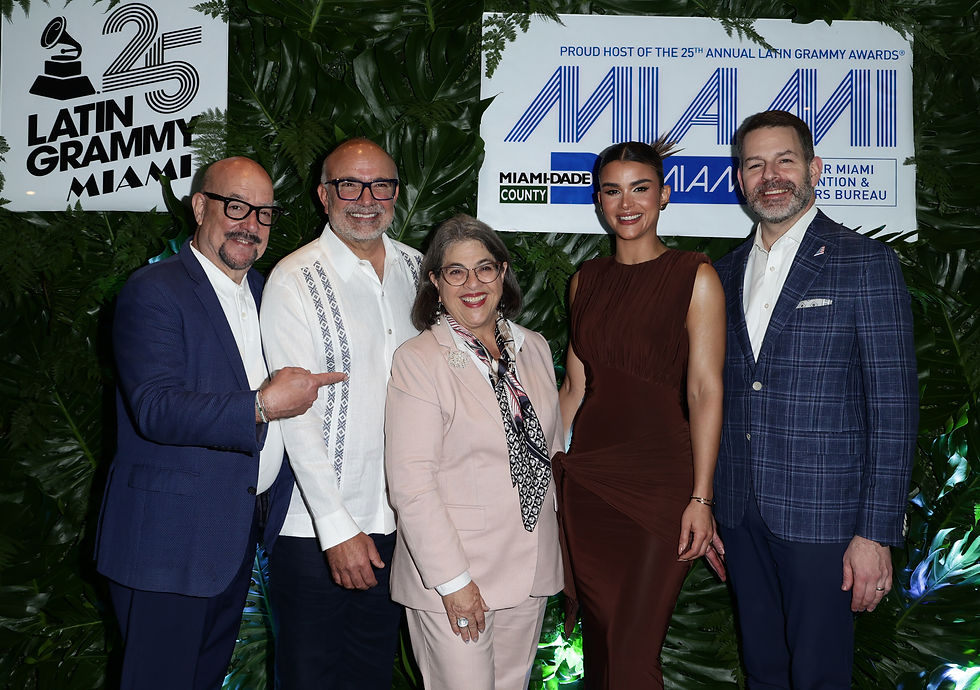Miami-Dade County Welcomes the World: A Historic Reception for the 25th Latin GRAMMY Awards
- Tyzza Macias

- Nov 18, 2024
- 3 min read

For the first time in its history, Miami-Dade County rolled out the red carpet for the world’s media, reaffirming its position as the cultural epicenter of Latin music. On a balmy evening in November, The Kimpton EPIC Hotel in downtown Miami became the focal point of a historic moment: the first-ever official welcome event for accredited international media attending the 25th Annual Latin GRAMMY Awards. This landmark reception underscored Greater Miami’s ascent as a global hub for Latin music and culture, cementing its reputation as a bridge between the Americas.
A Celebration of Culture, Music, and Miami’s Global Soul
The event brought together a constellation of luminaries whose presence symbolized Miami’s unique role in Latin music. Among those in attendance were David Whitaker, President and CEO of the Greater Miami Convention & Visitors Bureau (GMCVB); Miami-Dade County Mayor Daniella Levine-Cava; Manuel Abud, CEO of The Latin Recording Academy; Univision journalist and EMMY winner Clarissa Molina; and Stephen Neuman, VP of Global Government Affairs for American Airlines.
In his opening remarks, David Whitaker captured the significance of this milestone:
"Welcoming the Latin GRAMMY Awards® back to Miami-Dade County is not only a celebration of Latin music but a testament to the vital role Miami plays as a cultural capital. This iconic event is a powerful platform to showcase Miami's dynamic arts and culture scene, diverse communities, and thriving economy."
His words underscored Miami’s evolution from a regional hotspot to an indispensable player on the global cultural stage—a transformation driven by its unique confluence of Latin heritage, economic vitality, and artistic energy.
Latin GRAMMYs and Miami: A Harmonious Reunion
The Latin GRAMMY Awards’ return to Miami marked the third time the city hosted this prestigious event, with previous years including 2003 and the COVID-constrained 2020 ceremony. This year, however, felt larger in both scale and significance. For Miami-Dade County Mayor Daniella Levine-Cava, the event was more than a celebration of music:
"Hosting the Latin GRAMMY Awards not only honors our community's vibrant Latin roots but also shines a spotlight on our county as a global hub for culture and entertainment. As thousands of visitors fill our hotels, dine in our restaurants, and visit our small businesses, our workers and entrepreneurs benefit directly as they fuel our local economy."
This economic and cultural interplay is key to understanding Miami’s growing allure for international events. The influx of visitors during Latin GRAMMY Week exemplified how Miami’s hospitality sector—featuring premier venues like The Adrienne Arsht Center, The Phillip and Patricia Frost Museum of Science, and The Kaseya Center—can seamlessly host global audiences.
Miami: A Global Gateway and Cultural Crossroads
The decision by The Latin Recording Academy, headquartered in Miami, to anchor its 25th-anniversary celebrations here wasn’t coincidental. Miami is more than a city; it is a global gateway where North and South America meet. As Latin music continues to expand its global influence, Miami’s bilingual, bicultural identity offers an ideal setting for its celebration.
Juan Carlos Liscano, Vice President of MIA Operations for American Airlines, captured this sentiment:
"As Miami's Hometown Airline, we are committed to connecting communities and celebrating our diverse culture with deep roots in Latin America. Events of this magnitude bring thousands of travelers to the Greater Miami area, and that would not be possible without strong partnerships with Miami-Dade County and the GMCVB."
In a global context, Miami is emblematic of how cities are reshaping themselves as cultural hubs. Similar to how London anchors the global music scene or Paris champions the fashion world, Miami is solidifying its role as the epicenter of Latin music.
Beyond the Music: Miami’s Artistic Renaissance
The vibrancy of Miami’s arts scene amplifies its global appeal. From the murals of Wynwood to the glamour of Art Basel, the city radiates creativity. Initiatives like Art of Black Miami highlight the region’s dedication to inclusivity, adding layers to its multicultural identity. The return of the Latin GRAMMYs placed Miami’s dynamic arts scene in the global spotlight, further affirming its role as a cultural crucible.
As music and art converged during Latin GRAMMY Week, the city’s distinctive energy became palpable. Events showcased Miami not merely as a host city, but as a creative force in its own right—a place where culture thrives and connections are forged.
The 25th Annual Latin GRAMMY Awards were more than a celebration of music; they were a testament to Miami’s transformation into a global stage. As David Whitaker observed, Miami sits at the "intersection of multicultural heritage, culture, sports, entertainment, and music." For one extraordinary week, it proved its ability to captivate the world.
By hosting this historic event, Miami didn’t just spotlight its role in Latin music—it redefined what it means to be a global cultural capital. The city’s fusion of art, commerce, and community resonated far beyond its borders, reaffirming Miami-Dade County’s position as an indelible part of Latin music history.







